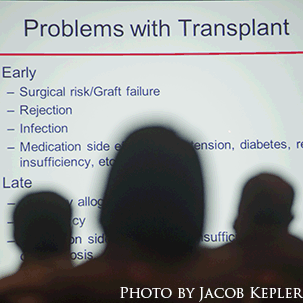User login
LAS VEGAS—Hospitalist Michael Hoftiezer, MD, has been to pre-courses at annual meetings before HM14, but yesterday’s lineup offered a new option: “Cardiology: What Hospitalists Need to Know as Front-Line Providers.”
The eight-hour seminar was one of three new pre-courses at SHM’s annual meeting, along with “Efficient High-Value Evidence-Based Medicine for the Practicing Hospitalist” and “NP/PA Playbook for Hospital Medicine.” The offerings drew hundreds of hospitalists to the unofficial first day of HM14 at Mandalay Bay Resort and Casino.
“It’s nice to have an extra day of learning,” says Dr. Hoftiezer, who practices at Holy Family Memorial Medical Center in Manitowoc, Wis. And “it’s concentrated on one subject. It’s a good overview of a single subject, rather than bouncing around different things.” Course director Matthews Chacko, MD, of Johns Hopkins Hospital in Baltimore, says the time is right for hospitalists to devote a full-day pre-course focused on cardiology. “Cardiovascular disease is the most common reason we die,” he says.
“It’s something hospital-based practitioners see often. Providing a comprehensive but yet simplified overview of the way to manage some of these diseases with talks given by some of the leading experts in the field seemed very appropriate for this meeting.”
The course covered such topics as arrhythmia, heart failure, peripheral artery disease, and unstable myocardial infarction. Dr. Hoftiezer says he gleaned tips he can take back to his hospital—including the mechanisms of atrial fibrillation and when to measure rhythm versus rate—and that’s what made the pre-course valuable.
“The more relevant, the better,” he adds. “My favorite lectures are the ones that change something I do.”
LAS VEGAS—Hospitalist Michael Hoftiezer, MD, has been to pre-courses at annual meetings before HM14, but yesterday’s lineup offered a new option: “Cardiology: What Hospitalists Need to Know as Front-Line Providers.”
The eight-hour seminar was one of three new pre-courses at SHM’s annual meeting, along with “Efficient High-Value Evidence-Based Medicine for the Practicing Hospitalist” and “NP/PA Playbook for Hospital Medicine.” The offerings drew hundreds of hospitalists to the unofficial first day of HM14 at Mandalay Bay Resort and Casino.
“It’s nice to have an extra day of learning,” says Dr. Hoftiezer, who practices at Holy Family Memorial Medical Center in Manitowoc, Wis. And “it’s concentrated on one subject. It’s a good overview of a single subject, rather than bouncing around different things.” Course director Matthews Chacko, MD, of Johns Hopkins Hospital in Baltimore, says the time is right for hospitalists to devote a full-day pre-course focused on cardiology. “Cardiovascular disease is the most common reason we die,” he says.
“It’s something hospital-based practitioners see often. Providing a comprehensive but yet simplified overview of the way to manage some of these diseases with talks given by some of the leading experts in the field seemed very appropriate for this meeting.”
The course covered such topics as arrhythmia, heart failure, peripheral artery disease, and unstable myocardial infarction. Dr. Hoftiezer says he gleaned tips he can take back to his hospital—including the mechanisms of atrial fibrillation and when to measure rhythm versus rate—and that’s what made the pre-course valuable.
“The more relevant, the better,” he adds. “My favorite lectures are the ones that change something I do.”
LAS VEGAS—Hospitalist Michael Hoftiezer, MD, has been to pre-courses at annual meetings before HM14, but yesterday’s lineup offered a new option: “Cardiology: What Hospitalists Need to Know as Front-Line Providers.”
The eight-hour seminar was one of three new pre-courses at SHM’s annual meeting, along with “Efficient High-Value Evidence-Based Medicine for the Practicing Hospitalist” and “NP/PA Playbook for Hospital Medicine.” The offerings drew hundreds of hospitalists to the unofficial first day of HM14 at Mandalay Bay Resort and Casino.
“It’s nice to have an extra day of learning,” says Dr. Hoftiezer, who practices at Holy Family Memorial Medical Center in Manitowoc, Wis. And “it’s concentrated on one subject. It’s a good overview of a single subject, rather than bouncing around different things.” Course director Matthews Chacko, MD, of Johns Hopkins Hospital in Baltimore, says the time is right for hospitalists to devote a full-day pre-course focused on cardiology. “Cardiovascular disease is the most common reason we die,” he says.
“It’s something hospital-based practitioners see often. Providing a comprehensive but yet simplified overview of the way to manage some of these diseases with talks given by some of the leading experts in the field seemed very appropriate for this meeting.”
The course covered such topics as arrhythmia, heart failure, peripheral artery disease, and unstable myocardial infarction. Dr. Hoftiezer says he gleaned tips he can take back to his hospital—including the mechanisms of atrial fibrillation and when to measure rhythm versus rate—and that’s what made the pre-course valuable.
“The more relevant, the better,” he adds. “My favorite lectures are the ones that change something I do.”

